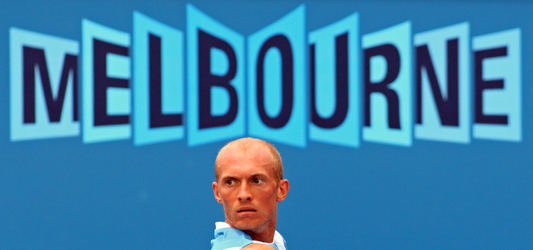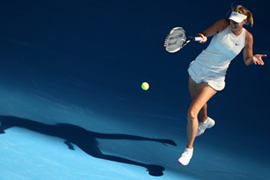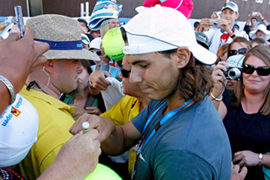Top players court anti-corruption
Davydenko and Murray say measures taken at the Australian Open are good enough.

 |
| Corruption allegations have dogged Davydenko both last season and into the first Grand Slam of 2008 [AFP] |
Top ten players Nicolay Davydenko and Andy Murray have told Al Jazeera that they believe the measures put in place at the Australian Open are good enough to fight corruption in tennis.
The Australian Open, which started on Monday, has set up an anti-corruption commission and appointed an investigator to deal with potential cases at the first Grand Slam of the season.
A ban on unauthorised laptop computers courtside, a telephone hotline to report alleged corruption and greater restrictions on player access are some of the preventative measures established as against match-fixing and illegal gambling.
Russian Davydenko, who won his first round match against Frenchman Michael Llodra on Monday, has been at the centre of allegations relating to dubious betting patterns last season.
His second-round defeat by Argentine Martin Vassallo Arguello at the Sopot Open in August is being investigated by the Association of Tennis Professionals (ATP).
‘Important for a Grand Slam’
He was trying to forget about the allegations to prevent them from affecting his performance: “For me, what was last year is happening last year, and now it’s a new year and I feel much more easy and am trying to concentrate on my tennis.
 |
| The measures apply to the men’s and women’s sections of the Open [AFP] |
“I think that the measures [at the Australian Open] are a good idea. It is important for a Grand Slam to start doing things like this.”
The maelstrom surrounding Davydenko last season included comments from world number nine Murray – who unexpectedly went out of the Australian Open on day one in four sets to Jo-Wildried Tsonga from France.
Murray apparently criticised his colleague for involvement in betting, something Britain’s number one denied to Al Jazeera: “At the time I was taken out of context. It was put to him as if I was having a go at him saying he was the one betting on matches and I think that it is a bit unfair to say that about someone, especially someone as good a player as him.
The Scot apologised to Davydenko for any misunderstanding on court after Murray’s victory over Davydenko in the semi-final of the Qatar Open in the first week of January – a tournament Murray went on to win.
Unwholesome proceedings
The 26-year-old Russian said that he accepted Murray‘s apology, but the incident shows how corruption, whether real or not, has sullied the game.
As Murray added: “I would never say that until someone is guilty. And there has been a long investigation and nothing has come out of it so far. So I thought it was a bit unfair.
“I can imagine that if I was in his situation and two or three of the players were saying ‘he’s guilty’ it wouldn’t feel great.”
So it is now up to tennis’ governing bodies to make amends.
Sal Perna, the managing director of Calibre International, the team behind the anti-corruption unit at the Australian Open, says that there is not a problem in the game, but that tennis is not excluded from such threats.
Allegations not instances
“It’s important that we recognise we are dealing with allegations generally and not substantiated instances.
|
|
|
“It is going to be really good for the players. Everyone is a bit more aware of what is going on now” |
“Tennis Australia has adopted a responsible program that is proportionate to the threat. This is good risk management.
“Our aim is to raise an awareness of the issue of corruption in sport and educate all those involved in this great game on the responsibility they have to the sport and themselves and what action to take if they become aware of any instances.
The Australian Open created their unit via speaking to bookmakers, reviewing corruption in other sports and talking to officials involved in those sports.
Perna says that the actions taken set a precedent in the game: “Tennis has a history of being a clean sport and it’s only in recent years that allegations have come to light.
“These anti-corruption measures have not been required in the past.
“[However], whilst we don’t believe that we have an integrity issue with the Australian Open, we feel that we need to be responsible and take a lead by being prepared if the problem occurs here.”
Raising awareness
Murray feels that the Australian Open is on the right track to keeping the sport free from any insinuation of corruption: “It is going to be really good for the players. Everyone is a bit more aware of what is going on now.
“[But] tennis is a pretty clean sport in comparison with a lot of the other sports.”
However, the 20-year-old doesn’t feel that those tennis players that have been punished so far regarding betting have been made into scapegoats.
Last season three Italian players; Potito Starace, Daniele Bracciali, and Alessio di Mauro were suspended for betting small amounts of money on other players matches.
 |
| The top seeds are hoping for a smooth start to the Grand Slam season[EPA] |
Rules governing tennis say that players are not allowed to make bets on any tennis matches.
“The rules are the rules. I thought the amount of money di Mauro was fined was a lot, when he wasn’t betting on his own matches or trying to do it for a substantial fee for himself,” Murray said.
“So it was a little bit tough for him but everyone knows what the rules are and you just have to be really careful with that sort of stuff.”
How tennis will continue in the long run is yet to be known.
As Perna says, being the first Grand Slam of the year the Australian Open is the first tournament to review the issue and decide how best to respond.
“The ATP has since initiated a global review into integrity in tennis which will take some time. In the meantime, the Australian Open will provide a learning experience.”